(!)NOTE : Windows 7 users won’t be able to use some latest features of eCatalog/WOS since Microsoft is ending support for Windows 7 on 14 Jan, 2020. Please upgrade your system for uninterrupted services.
- Notice of End of Sales for Economy Series Pneumatic Equipment Category. More information.
Specification/Dimensions
-
Number of Links(Units)
-
type
- C-CHE60
-
CAD
- 2D
- 3D
Days to Ship
-
- All
- 15 Day(s) or Less
Specify Alterations
Chains Nominal No.60/Joint Link (Part Number)
Copy Part Number URL to Clipboard
The part number URL has been copied into your clipboard.-
- Order Qty :
-
-
- Price :
- ---
-
- Total Price :
- ---
-
- Days to ship :
- ---
Select part number to Order Now/ Add to Cart
Product Description
- Chains Nominal No.60/Joint Link from MISUMI.
- This chain type is economy series of standard chains.
- Chain nominal No. is 60 while pitch No. is 19.05 mm.
- Max. Allowable Tension of chain is 8.83 kN.
- Can be selected fixed type which the number of chain links is 80 links, circumference length is 1,524mm. Or configurable type which can be configured 4 to 9998 links (2 links increment).
- Chains are made of steel.
- This series is ISO Standard 12A (ANSI 60) roller chain and can be used in combination with our 60B series sprocket.
Economy Chains Nominal No.60/Joint Link
- Choose from fixed or customizable configurations to accommodate diverse industrial needs with precision.
- High Tension Capacity: With a maximum allowable tension of 8.83 kN, this chain is engineered to handle substantial loads, ensuring reliable performance in demanding applications.
- Conforms to standards for compatibility with MISUMI’s products.
- Constructed from robust steel, promising durability in high-temperature environments.
- Ideal for both power transmission and workpiece transfer, offering versatile solutions.
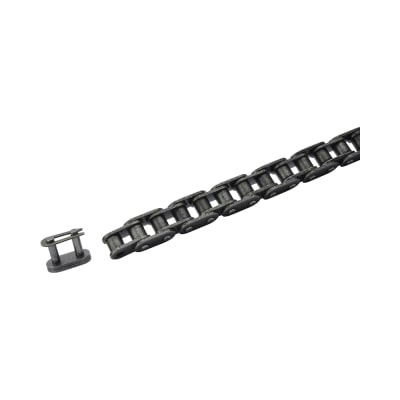

![]()
MISUMI Standard
![]()
Cheaper Price
![]()
Product Variety
![]()
3D CAD Support
Product Overview of Chains
■Only sprockets and Chains with the same specifications can be used in combination.
This series is ISO Standard 12A (ANSI 60) roller Chains, and can be used in combination with our 60B series sprocket. Do not use it with European Standard 12B sprocket, which may cause the Chains sprocket mechanism to fail to function properly!
■ Product Composition of Chains
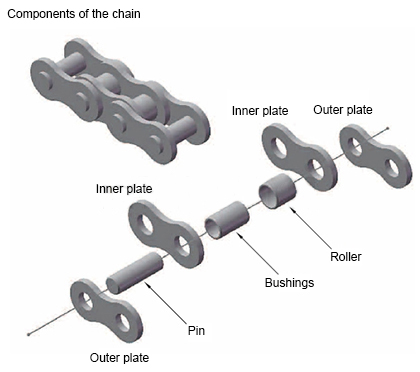
Dimensional Drawing of Chains
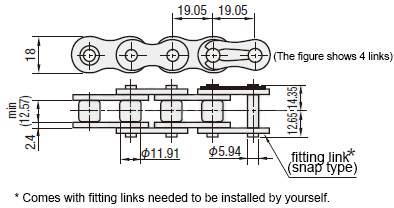
 Material: Steel
Material: SteelSpecifications Overview of Chains
This series is ISO Standard 12A (ANSI 60) roller Chains, and can be used in combination with our 60B series sprocket. Do not use it with European Standard 12B sprocket, which may cause the Chains sprocket mechanism to fail to function properly!

Product Feature of Chains
1. Multi-tooth load bearing, safe and reliable;
2. Flexible transmission, absorbing shock and vibration;
3. Large center distance range, low manufacturing and mounting accuracy requirements;
4. Compared with belt drive, the transmission ratio is accurate and the transmission efficiency is higher, suitable for high temperature.
■Two main purposes of the Chains:
1. Connect the motor for transmission 2. Place the workpiece directly or indirectly on the Chains for transfer
Example Use of Chains
A mechanism that can convert motor power into roller rotation by combining multiple sprockets and Chains
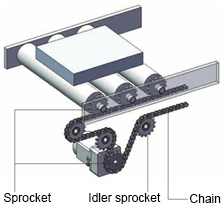
A chain conveyor frame with high versatility using flat profiles and Chains guides

A mechanism used to mount accessories on the Chains, and extract and transport workpieces
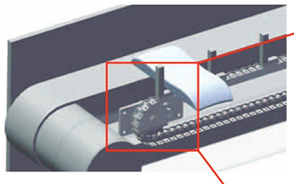
Precautions of Chains
If you need to cut the chain by yourself, please confirm whether the chain link to be cut is an inner link or an outer link. If it is a single section after being cut off, it may need to be used with an offset link head.
Usage Method of Chains
■Horizontal
Even when the two axes are arranged horizontally, the rotation direction of the axis must be considered.
The examples (2) and (3) in the figure show that when the Chains is stretched, the disengagement between the sprocket teeth and the chain is not smooth and may bite.
In particular, the upper and lower chains in (3) will contact each other, so an idler is required.
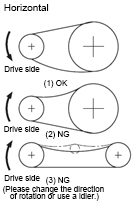
If the Chains is stretched, slack as shown in (5) will occur, and
when a small sprocket is used on the lower side, the chain may fall off. Therefore, please use it at an angle of 60 or less as shown in (4).
When it is necessary to use it vertically due to the mechanism or space, it is recommended to put the large sprocket on the lower side, and
use the idler on the outside or inside as shown in (6).

Deflection is generally about 4% of the shaft spacing, and about 2% in the following cases.
a. Vertical transmission or close to vertical transmission
b. Shaft spacing is more than 1m
c. When frequent heavy load starting and stopping are required
d. When reverse rotation is required

If a tension adjuster is mounted on the tension side or slack side of the Chains to provide initial tension in advance, it will eliminate vibration and reduce noise during operation.

Related Products of Chains
 |
| Sprocket 60B |
Part Number
- Incomplete part number.
Please use left hand selections to complete a part number.
Basic Information
| Type | Standard Chains | Nominal Number | 60 | Pitch | 19.05 |
|---|---|---|---|---|---|
| Number of Strands | 1 | Material | Steel | Surface Treatment | Not Provided |
| Max. Allowable Tension(kN) | ~99 | Type | Specified Number of Knots |
- The specifications and dimensions of some parts may not be fully covered. For exact details, refer to manufacturer catalogs .
Frequently asked question (FAQ)
- Question: I bought MISUMI chains, but why can't I use them on my original sprocket?
- Answer: Please confirm the specifications of the original sprocket and chain. Specification series number may not match. In addition, there are two specifications: A series and B series in China. The two specifications of sprocket chain are not universal.
- Question: Does the chain need routine maintenance after installation and use?
- Answer: The chain needs regular maintenance after installation and use. These include daily lubricant application, confirmation of chain slack. The quality of lubrication will affect the life of the chain. Especially in recent years, high-speed use has been increasing, so it is necessary to take efficient lubrication methods.
- Question: Does the chain purchased come with joints, and if any, how many joints?
- Answer: In principle, one chain comes with one joint. If the customer needs multiple joints to use, you can buy it yourself, we have separate joints to choose from. Please refer to the chain type when purchasing joints.
- Question: How to use the carrier chain?
- Answer: The carrier chain can only be used for transmission, not for scenarios with large load and high positioning accuracy, please be careful!
- Question: Can the chain be cut off when it is extended?
- Answer: It can be cut off. Our company has simple chain cutter available for selection.




How can we improve?
How can we improve?
Thank you for your time.
Your feedback is essential for our continuous improvement
Privacy Policy
Thank you for your cooperation.
Thank you for your time.
Your feedback is essential for our continuous improvement
Please use the inquiry form.
Privacy Policy